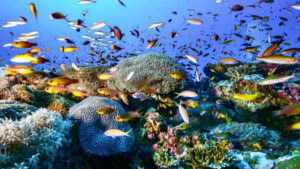Want to measure your stock’s ESG impact? There’s an app for that

ESG monitoring will now require less swiping
One factor holding people back from ethical investing is the difficulty in measuring and monitoring a company’s impact.
But now there’s an app that can do just that.
Global Impact Initiative (GII) and fintech World Wide Generation (WWG) teamed up to launch G17Eco, a blockchain-based platform that can measure the impact of a company’s environmental, social and governance (ESG).
G17Eco was launched last week and while it is only available in a desktop format operating via a subscriber model right now, the two companies promise a mobile version will be available in the not-too-distant future.
The program measures a company’s ESG impact against the United Nations Sustainable Development Goals (UN SDGs).
These map sustainable change across things like poverty, climate change and ocean pollution.
Data is obtained through a wide range of public sources from company annual reports and not for profit organisations.
COVID-19 fast tracks ESG
GII boss Giles Gunesekera told Stockhead the project had been five years in the making.
And the launch looks to be perfectly timed, with the COVID-19 pandemic and last summer’s bushfires prompting investors to rethink where they invest their hard earned cash.
“In a post-COVID world … we have conversations on a daily basis with a wide variety of organisations and individuals saying ‘we just don’t want to go back to the way it was’,” Gunesekera said.
“Whether that is, they don’t want to go back to their job the way it was or want their organisation to behave differently or as individual investors they want to change.
“Because people for the first time in history have had a chance to properly reflect on what’s important.
“COVID-19 has accelerated people’s thoughts on this but now it’s moving much more out of thoughts and into action.”
More exclusions than inclusions
One paradox of ethical investing is that while many investors agree on what is unethical, there’s less consensus on what is ethical.
Gunesekera acknowledges this, noting far more portfolio managers have made exclusions rather than inclusions on an ethical basis.
“That definition of what is ethical is unique for each individual,” he said.
“We made a firm commitment that none of our portfolios will have any exposure to alcohol, gaming, tobacco, weapons, fossil fuels and adult entertainment.
“There are lots of super funds at the moment that are specifically excluding at least tobacco and gaming. It really depends on the organisation, the board, the investment committee that would make that decision.”
Best way to benchmark performance
Gunesekera believes benchmarking a company’s ESG impact against the UN SDGs is justified.
“It’s basically a list of what the world needs to do — gender equality, better water, better sanitisation, sustainable cities, climate — a whole bunch of things that need to happen,” he said.
“The great thing about the UN SDGs is there’s a lot of metrics and targets sitting in those. There’s 164 metrics, 169 targets so you can get granular in how you’re measuring your social impact.
“It’s not just this motherhood statement of these are 17 things that need to happen and now you go away and do it. It actually gives you a lot of quantitative and quantitative ways of measuring your impact.”
However, Gunesekera says for a lot of corporates, funds and investors it is about maximising profits.
And that is a metric the G17Eco program can also measure.
“Now through this platform and the way we work at GII we are able to say this fund returned X per cent per annum, but this is the contribution it made to the UN SDGs,” he said.
UNLOCK INSIGHTS
Discover the untold stories of emerging ASX stocks.
Daily news and expert analysis, it's free to subscribe.
By proceeding, you confirm you understand that we handle personal information in accordance with our Privacy Policy.








